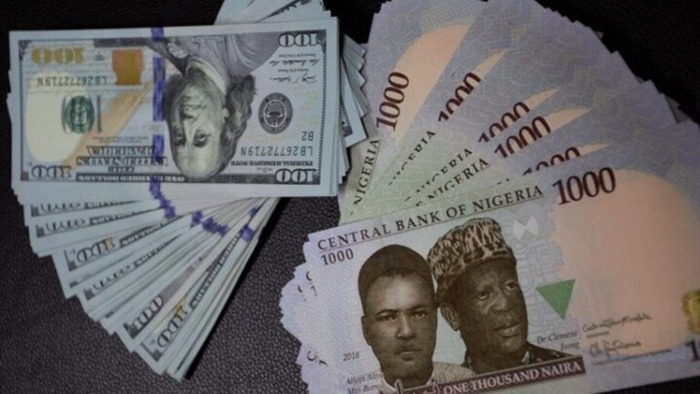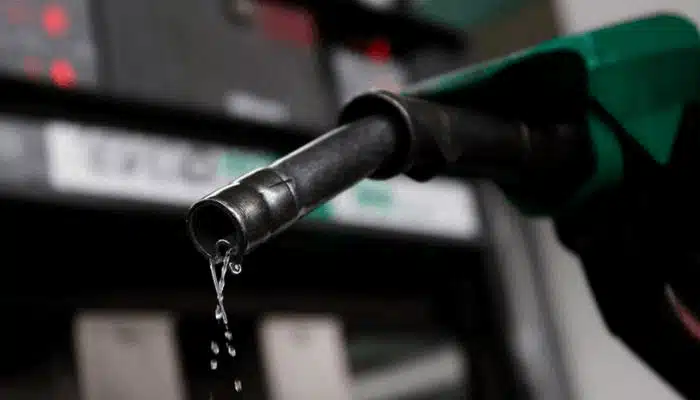Business
Naira falls as strong demand gulps $465.29m FX sales
Nemo enim ipsam voluptatem quia voluptas sit aspernatur aut odit aut fugit, sed quia consequuntur magni dolores.

The naira fell by 0.98 percent at the official foreign exchange (FX) market on Tuesday following strong demand for dollars, which gulped $465.29 million sold by banks.
After trading on Tuesday, the naira depreciated against the dollar to close at N1,433.89, weaker than N1,419.86 quoted on Monday at the Nigerian Autonomous Foreign Exchange Market (NAFEM).
Willing buyers and willing sellers, including commercial banks, sold $465.29 million on Tuesday, representing 20.39 per cent lower than the $584.53 million sold on Monday.
Intraday high strengthened to N1,519.78 on the spot on Tuesday as against N1,526 quoted for the past three trading days. Similarly, intraday low firmed to N894.99 per dollar from N906 quoted the previous day.
At the parallel market, also known as the black market, the local currency depreciated to N1,480 per dollar, representing 2.70 per cent weaker than N1,440/$1 exchanged on Monday.
The FX market in Nigeria witnessed a notable surge in the value of the Naira following adjustments made by the Central Bank of Nigeria CBN) aimed at bolstering dollar supply. This move resulted in three instances of Naira appreciation within a short span.
Data compiled by the FMDQ Securities Exchange Limited revealed that turnover in Nigeria’s FX market soared to $844 million on February 3, marking the highest trades recorded since June 2, 2022.
The increased turnover underscores the positive impact of the CBN’s reforms on market liquidity and investor confidence. These reforms are designed to enhance dollar availability and stability in the FX market, mitigating currency volatility and supporting economic growth.
Business
Who was Herbert Wigwe?

Herbert Onyewumbu Wigwe, a luminary in the Nigerian banking sector, was born on August 15, 1966 in Isiokpo, Port Harcourt, Rivers State. As the CEO of Access Holdings Plc, traded as Access Corporation, Herbert Wigwe carved a niche for himself in the world of finance.
From humble beginnings to a banking titan
Wigwe’s academic journey was as impressive as his professional ascent. With a degree in accountancy from the University of Nigeria and further education in Banking and Finance, Financial Economics, and an executive program from Harvard Business School, he was well-equipped for the challenges ahead.
His career began at Coopers & Lybrand, Lagos, before moving to GTBank, where he spent over a decade honing his skills in corporate and institutional banking. The turning point came in 2002 when he and Aig-Imoukhuede took a bold step by investing in Access Bank, then a small player in Nigeria’s banking industry.
Under Wigwe’s visionary leadership, Access Bank transformed into a powerhouse, now serving over 6.5 million account holders and ranking among the top 500 global banks. His roles extended beyond banking, as he served in various capacities, including as the Chairman of Access Bank Ghana Limited and a member of several prestigious boards.
A legacy of innovation and philanthropy
Wigwe’s impact was not limited to banking. His passion for philanthropy led him to establish the Herbert Wigwe Foundation, fostering education and entrepreneurship in Nigeria. His dedication earned him the Order of the Niger (CON) and admiration from peers and the public alike.
The dream of Wigwe university
Perhaps Wigwe’s most ambitious project was the establishment of Wigwe University. Launched with a $500 million investment, the university aimed to revolutionise higher education in Nigeria and West Africa. With a focus on management, science, engineering, and the arts, Wigwe University was set to provide world-class education, blending traditional methods with innovative technology.
The university, situated in Isiokpo, Port Harcourt, was approved by the National Universities Commission in June 2023. Its curriculum was designed to address critical sectors such as finance and technology, while also nurturing leadership and entrepreneurial skills.
Wigwe’s vision was clear: to create an institution that could compete globally, yet remain distinctly African. He planned to recruit top teaching talents from around the world, focusing on making education a tool for shaping fearless, innovative leaders.
An unparalleled educational experience
Wigwe University promised not just academic excellence but a holistic approach to education. Sports, arts, and practical experience were integral parts of its curriculum, ensuring that students received a well-rounded education. The university’s inaugural batch was expected to be a diverse group of 1,400 students, with plans to increase enrollment significantly over the next five years.
Business
Lagos begins N750m ‘Trader Money’ payment

The Lagos State Government, on Wednesday, flagged off the Lagos Market Trader Money Initiative to give N50,000 cash to each of 15, 000 traders in the state to boost their businesses.
Governor Babajide Sanwo-Olu, while unveiling the programme at LTV8, Agidingbi, Ikeja, said the beneficiaries were selected through a methodical process.
The governor said 200 of the beneficiaries were selected from markets in each of the 57 local government
areas and local council development areas.
He said 50 beneficiaries were selected by the Iyaloja/Babaloja General in each LGA/LCDA making a total of 14,250 traders.
“750 beneficiaries were identified from markets within the barracks and military formations across the state in collaboration with their respective Iyaloja/Babaloja. This brings the total number of beneficiaries to 15,000.
“To ensure fairness in the selection process while demonstrating the spirit of Lagos as being home to all, the beneficiaries were drawn from across all the geopolitical zones of the nation with 11,039 from the South-West, 914 from the South-East, 868 from the South-South, 1,710 from North-Central, 373 from the North-West and 107 from the North-East,” Sanwo-Olu said.
He added that 74 per cent of the beneficiaries were women while the remaining 26 per cent were men.
He said 33.7 per cent of them are below 40 years while 66.3 per cent are above 40 years.
The Commissioner for Agriculture, Abisola Olusanya, explained that: “This initiative is part of the government’s efforts towards ensuring sustainable livelihoods and wealth creation for traders across the state.”
Business
President Bola Tinubu ‘Silently’ Re-introduces Fuel Subsidy’

The administration of President Bola Tinubu has been accused of silently re-introducing the payment of fuel subsidies in Nigeria in order to keep the price of petrol stable.
The administration of President Bola Tinubu has been accused of silently re-introducing the payment of fuel subsidies in Nigeria in order to keep the price of petrol stable.
The allegation was made by the International Monetary Fund (IMF) in a statement over the weekend.
Recalls President Tinubu in his inauguration speech during his swearing-in on May 29, 2023, famously announced an end to the fuel subsidy regime.
The president has since maintained that the subsidy payment is an albatross on the nation’s economy, crippling the economy and enriching a few.
The decision marked an immediate spike in the price of petrol, which went up from about N187/litre to N300, N400, and has maintained a steady increase, with most filling stations in the country currently selling above N600/litre.
The increase in petrol price has led to a sharp increase in the price of other items and commodities, including foodstuff and transportation, with many Nigerians groaning under the weight of the price increases.
However, the IMF, in a statement issued at the conclusion of its Executive Board’s Post Financing Assessment with Nigeria, however, said the Tinubu government has re-introduced subsidy through the backdoor by capping the price of fuel at retail stations.
The IMF also urged the government to completely stop the payment of subsidies on petrol to free funds to run the government.
The IMF, in its latest statement at the weekend, said the Tinubu administration has “capped retail fuel and electricity prices” ostensibly to “ease the impact of rapidly rising inflation on living conditions, thus partially reversing the fuel subsidy removal.”
According to Daily Trust, an investigation in September revealed that the federal government paid N169.4 billion as subsidy in August to keep the pump price at N620 per litre.
The platform said a document from the Federal Account Allocation Committee (FAAC), sighted by one of its reporters, showed that in August 2023, the Nigerian Liquefied Natural Gas (NLNG) paid $275m as dividends to Nigeria via NNPC Limited. NNPC Limited used $220 million (N169.4 billion at N770/$) out of the $275 million to pay for the PMS subsidy. Then NNPC held back $55 million, illegally.
-

 Entertainment7 months ago
Entertainment7 months agoGrand Finale
-

 Entertainment8 months ago
Entertainment8 months agoActress Toyin Abraham Urges Parents To Train Up Children With Good Character And Values
-

 Entertainment8 months ago
Entertainment8 months agoActress Eniola Badmus Expresses ‘Thanks’ For Her New Appointment
-

 Entertainment10 months ago
Entertainment10 months agoThe Big One Is Here
-

 Entertainment9 months ago
Entertainment9 months agoActress Hope Samuel Wins Yar’Adua International Leadership Award
-

 Entertainment12 months ago
Entertainment12 months agoAli Nuhu Mohammed
-

 Entertainment9 months ago
Entertainment9 months agoProminent Nigerian Music Star, Fireboy, Releases New Single ‘Everyday’
-

 Entertainment9 months ago
Entertainment9 months agoHow Nigerian Movie Industry Can Grow – Chidi Dike















